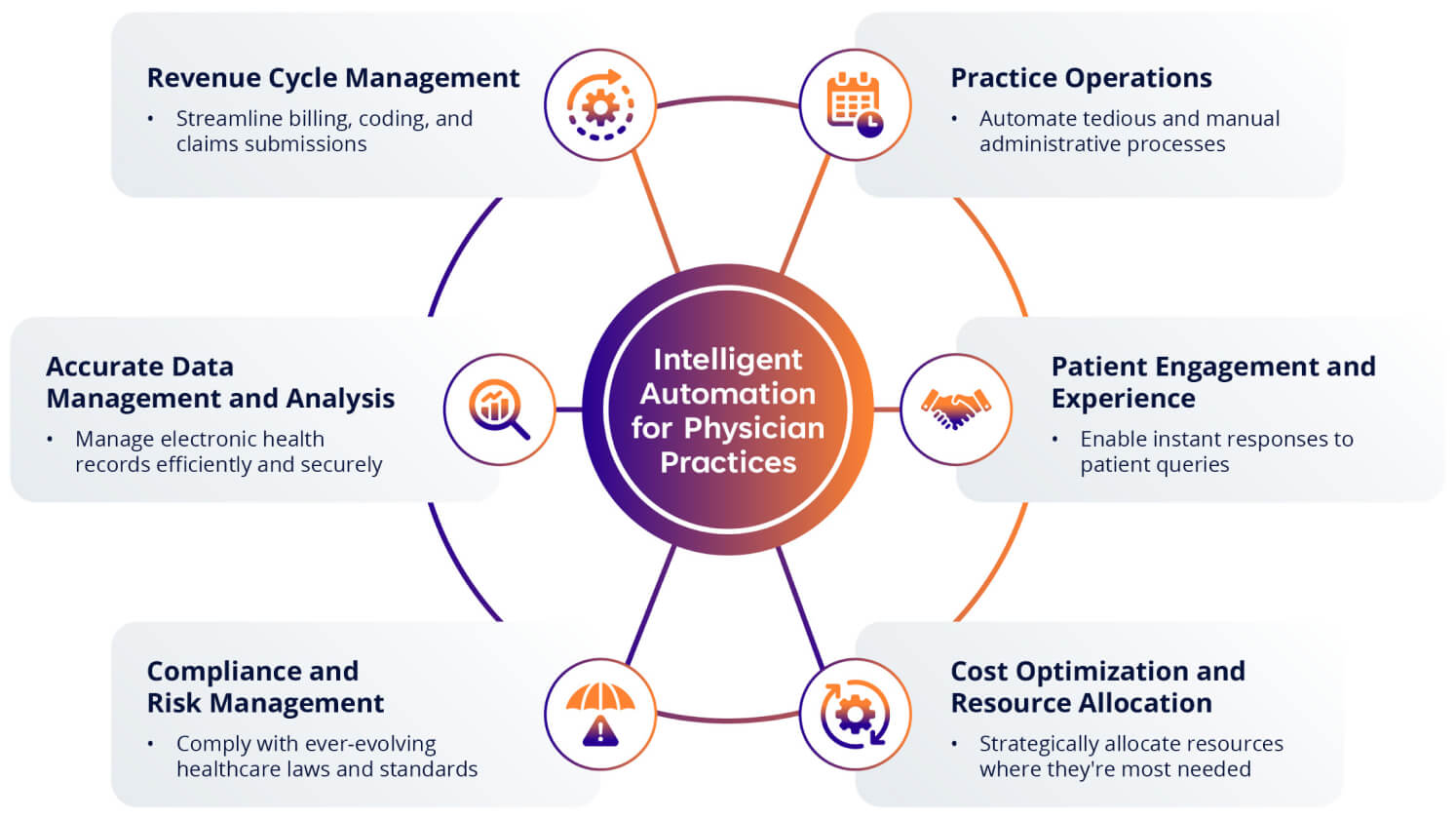The Power of Intelligent Automation | A Guide for Physician Practices and Specialty Groups
Overcome staffing shortages, administrative burdens, and rising operational costs while enhancing patient care with intelligent automation.

Making the case for intelligent automation
Recruiting qualified personnel is becoming increasingly challenging for physician practices, with staffing shortages contributing to a rise in medical errors.

Today’s physician practices and specialty groups face many obstacles to efficiently delivering high-quality care. The administrative burden placed on healthcare providers continues to escalate, with increasing documentation requirements, complex billing processes, and regulatory compliance mandates consuming valuable time and resources.
Rising operational costs associated with maintaining facilities, purchasing medical equipment, and managing overhead expenses further compound healthcare organizations' financial challenges, particularly in the face of declining reimbursement rates and payment reforms.
Additionally, physician practices and specialty groups are contending with a need for more qualified healthcare professionals, including physicians, nurses, and allied health professionals, exacerbating workload pressures and straining existing staff members.
According to a Medical Group Management Association (MGMA) Stat Poll1 in late 2022, up to 73% of medical group practices reported recruitment of qualified personnel as the biggest challenges they faced. In a report by Survey Healthcare Global2, 34% of physicians surveyed said staffing shortages resulted in an increase in medical errors.
In an increasingly complex healthcare landscape, intelligent automation (IA) offers a compelling solution to these pressing challenges.
Discover how practices can now leverage automation technologies such as robotic process automation (RPA), artificial intelligence (AI), and machine learning (ML) to enhance efficiency, reduce costs, deliver high-quality care, and pretty much do better with less.
6 ways physician practices can harness the power of intelligent automation
As healthcare delivery continues to face unprecedented challenges, from rising administrative burdens, shortage of skilled labor, and rising operational costs to increasing patient demands, the adoption of automation technologies offers a transformative solution.
IA allows practices to unlock new efficiencies and innovation in these six key areas:

1. Revenue cycle management
Revenue cycle management (RCM) is at the core of every healthcare organization. IA's RCM solution streamlines every stage, from appointment scheduling and insurance verification to claims processing and payment collection.
By automating billing, coding, and claims submissions, errors are reduced for faster reimbursement cycles. This leads to improved cash flow, decreased revenue leakage, and optimized revenue generation, ultimately providing financial security for physician groups.
2. Practice operations
One of the primary challenges physician groups face is managing administrative duties efficiently, from appointment scheduling and billing to claims processing.
IA helps reduce this administrative workload so healthcare professionals can focus on patient care instead of tedious (and manual) administrative processes that take up their time and attention.
Automating administrative processes results in more streamlined workflows, decreased human errors, and improved business operational efficiency.
3. Accurate data management and analysis
For informed decision-making, accurate access to patient data is of utmost importance. IA solutions efficiently manage electronic health records, ensuring data accuracy, security, and accessibility.
Furthermore, its data analysis capabilities facilitate predictive analytics. This enables physicians to anticipate patient needs, recognize trends, and provide proactive healthcare services—contributing to improved patient outcomes and evidence-based medicine.
4. Patient engagement and experience
Patient satisfaction is of utmost importance in healthcare. Interactive agents such as chatbots and virtual assistants enable instant responses to queries related to appointment scheduling assistance, billing inquiries, and any additional communication that improves engagement and increases overall satisfaction.
Furthermore, automated reminders ensure patients remain well-informed and feel cared for throughout their healthcare journey.
5. Compliance and risk management
Adherence to healthcare regulations is non-negotiable. IA ensures adherence by automating compliance checks, proper documentation, and reporting requirements.
This mitigates human error while decreasing legal complications or penalties, providing physicians with peace of mind that their business practices comply fully with ever-evolving healthcare laws and standards.
6. Cost optimization and resource allocation
Financial stability is vital for physician groups' survival. IA has proven its worth as an effective tool for cost optimization by automating tasks, reducing manual errors, improving efficiency and decreasing operational costs.
Furthermore, its data analysis capabilities aid physician groups in optimizing resource allocation by strategically allocating resources where they're most needed, improving patient care while increasing financial security for the organization.
Getting started with IA integration
IA involves complex technologies and strategic planning that require specialized knowledge and experience to implement effectively.

Third-party experts allow practices to accelerate the implementation process, mitigate risks, and maximize the return on investment.
Equipped with valuable insights, skills, and resources, these experts have a deep understanding of automation technologies, industry best practices, and regulatory requirements to design tailored solutions that address healthcare practices' unique needs and challenges.
From initial assessment and planning to implementation and optimization, the ideal automation partner can help practices:
-
Identify opportunities for automation
-
Prioritize initiatives based on strategic goals
-
Develop a roadmap for implementation
This leaves you and your team free to focus on your patients and ensures minimal disruptions to day-to-day operations.
Paving the path forward with intelligent automation
At its core, IA is about driving business transformation by enabling practices to do more with less. It allows practices to automate routine and repetitive tasks, freeing up valuable time and resources that can be redirected toward higher-value activities.
This enables practices to:
-
Improve efficiency and scale operations
-
Expand service offerings without significantly increasing overhead costs
-
Make data-driven decisions and enhance patient engagement
-
Adapt to changing market dynamics more effectively
By leveraging automation technologies to analyze vast amounts of data from electronic health records, patient portals, and other sources, practices gain actionable insights into patient needs, preferences, and outcomes. This empowers them to tailor their services, improve care quality, and differentiate themselves in an increasingly competitive healthcare landscape.
Getting started with IA doesn't have to be difficult.
Choosing to work with experienced automation specialists means physician practices can streamline the integration process, minimize disruptions to operations, and position themselves for long-term success.
Ultimately, IA is about driving holistic business transformation that enables physician practices and specialty groups to deliver exceptional care to their patients and thrive in the age of "healthcare unchained".
Transform your practice with intelligent automation
Don't let staffing shortages and administrative burdens hold your practice back. Take the next step towards a more efficient and innovative future with RCG. Our team of automation experts is ready to collaborate with you to implement intelligent automation solutions that transform your operations and elevate patient care.
Connect with our experts to learn more.
Download a PDF version of this ebook by filling out this form.

